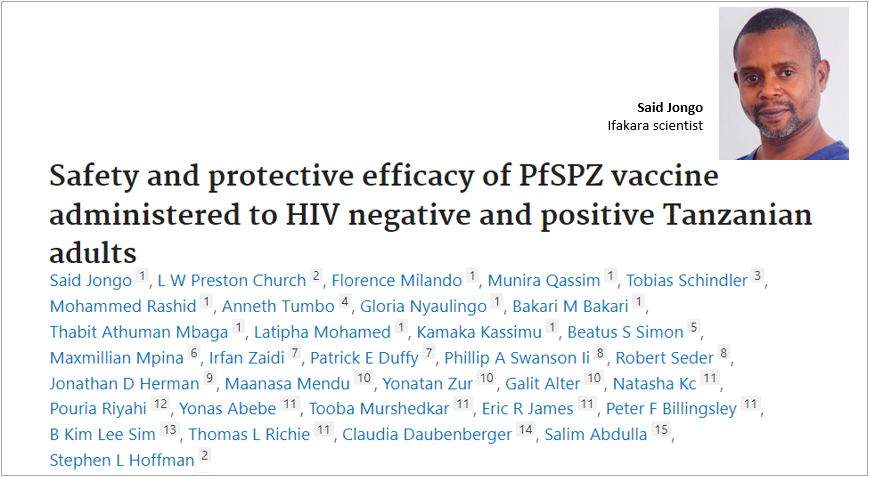
CLINICAL TRIAL: Malaria vaccine “safe, well-tolerated” by those living with HIV

The PfSPZ malaria vaccine designed to protect against malaria, has been found to be safe and well-tolerated in both HIV-negative and HIV-positive individuals, according to a recent study conducted by a team of scientists from Tanzania, the USA and Switzerland.
The study, published on The Journal of Clinical Investigation, aimed to evaluate the vaccine's safety in individuals with HIV and its ability to protect against malaria. Furthermore, the study also sought to address concerns related to mass vaccination programs, particularly when participants' HIV infection status is uncertain.
Safety confirmed
“We achieved the primary goal of this clinical trial, establishing that PfSPZ Vaccine was well tolerated and safe in a small number of HIV+ individuals. The vaccine was safe and well tolerated, but not protective. Vaccine efficacy was 80% in HIV- vaccines,” reports the scientist.
The scientists involved in the study include Ifakara Health Institute scientists, Saidi Jongo - the lead author, Salim Abdulla, Florence Milando, Munira Qassim, Mohammed Rashid, Anneth Tumbo, Gloria Nyaulingo, Bakari Bakari, Thabit Mbaga, Latipha Mohamed, Kamaka Kassimu. Beatus Simon and Maxmillian Mpina.
Other contributors were from Sanaria Inc., the Swiss Tropical Public Health Institute (Swiss TPH), the National Institute of Allergy and Infectious Diseases (NIAID) & the Vaccine Research Center which are part of the National Institute of Health (NIH), Harvard Medical School and Massachusetts General Hospital and The Ragon Institute of Mass General, MIT, and Harvard.
Tests conducted in Tanzania
The trial, conducted in 2018 was carried out at the IHI’s Biomedical Research and Clinical Trials department formerly known as the Bagamoyo Clinical Trials Unit of Ifakara Health Institute in Tanzania.
It involved 18-45-year-old participants without HIV and those with well-controlled HIV who were given five doses of the PfSPZ Vaccine or normal saline over 28 days, followed by controlled human malaria infection (CHMI) three weeks later.
Varying efficacy of the vaccine
Contrary to the success observed in HIV-negative participants, results showed the PfSPZ vaccine did not provide effective protection in those living with HIV. Notably, the study revealed that HIV-positive participants exhibited “weakened functional antibody responses”, which are crucial for fighting off malaria infections.
These outcomes raised questions about the impact of long-term HIV-related immune changes on vaccine response with the scientists attributing the long-term effects of HIV on the immune system as the reason for the lack of protection.
According to them, the immune responses in HIV-positive individuals, especially specific T cells and antibodies, were not as strong as in those without HIV as evidence showed, suggesting the need for further research.
“More work, such as antibody avidity and dissociation assessments, is needed to clarify the underlying mechanism driving this difference in vaccine response and potential efficacy, to find vaccination strategies that will protect both HIV+ and HIV- individuals,” they wrote.
What are future plans?
Looking ahead, the scientists suggest that a more effective PfSPZ Vaccine or an alternative vaccination regimen is needed to effectively protect people living with HIV against malaria.
They propose several strategies to improve the vaccine's effectiveness including evaluating different vaccine doses and dosing regimens of the PfSPZ Vaccine, considering presumptive malaria treatment before vaccination, and testing more potent versions of the PfSPZ Vaccine already manufactured and are currently undergoing clinical trials.
“One approach will be to assess different doses or dosing regimens of PfSPZ Vaccine, including our down-selected regimen of 9.0x105 PfSPZ on days 1, 8, and 29. Another will be to include the institution of presumptive treatment for malaria prior to the first vaccine dose, to reduce the immunosuppressive effects of latent parasitemia."
"A third is to move to more potent PfSPZ vaccines like PfSPZ-CVac (CQ) or genetically attenuated late arresting replication-competent (LARC) PfSPZ vaccines, which have been manufactured and will enter clinical trials in 2023," proposed the scientists.
Read the publication here.
